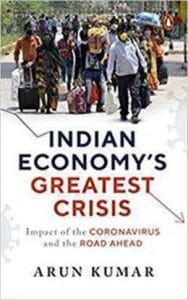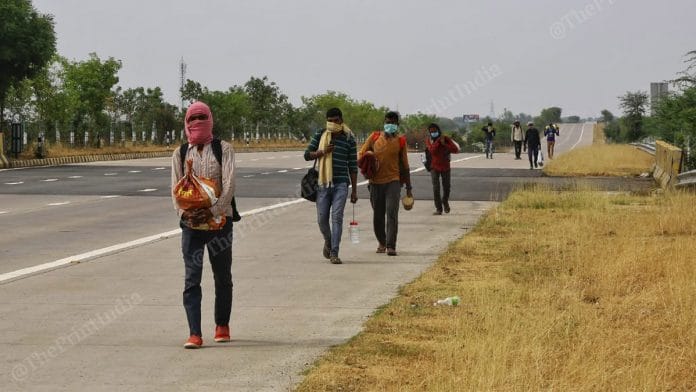The economies of the world have faced crises from time to time and weathered the storms. There are wars in which production gets disturbed and there are recessions when the economies go into reverse gear. The question is: Will the experience of how to deal with these crises help in the present situation?
The countries in lockdown were producing a fraction of what they used to in pre-pandemic times. As a result, income generation fell drastically. However, consumption has to continue. Savings are the difference between income and consumption. So, as incomes fall and consumption falls less, savings decline. Those who lose work and have no income have to dissave—that is, they have to use up their past savings. Investment by businesses almost stops due to decline in demand and the uncertainty prevailing about the future. These are conditions that have not been experienced since the Great Depression. So, will the experience of the recessions and depressions help now?
Actually, the situation is worse than what had happened during the depression of the 1930s or during the world wars.
During wars, production does not fall—it only gets reoriented to the requirements of war. For example, in Germany during the Second World War, a chocolate factory started to produce airplane propellers. In the US, car factories started to produce aircraft. Further, there was no unemployment because people were drafted into the war effort. This is the opposite of what is being faced during the lockdown now. There is massive unemployment since production has stopped, and people have been laid off.
During recessions and depressions, demand is down and unemployment is high, but it is not that supply stops. There is no curb on producing things. Production is down not because people cannot go to work but because their demand for what is being produced declines. In a lockdown, production cannot take place, so both supply and demand collapse.
Also read: Blaming Covid for all economic mess is telling half truths
Simultaneously, workers get laid off and their incomes fall, and most businesses close down and their profits fall and even turn into losses. The result is that a large number of people lose their incomes and, therefore, demand falls drastically. This is a unique situation and past experiences of dealing with crises are no guide to predicting what will happen in future and how one should deal with the present situation.
In brief, during a lockdown, there is voluntary stoppage of production by society and that leads to a shrinkage of the resource base of the economy. Such a situation is unprecedented.
Therefore, there is need for a new macroeconomic understanding of the situation. The macro-variables—output, employment, prices, savings, investments and foreign trade—need to be reformulated and studied in the light of the changed situation.
Also read: Why India wants a V-shaped economic recovery at any cost
In this chapter, it is argued that to understand the nitty-gritty of the impact of the lockdown, its broad macroeconomic impact needs to be analysed. It is pointed out that the situation is worse than during a war or during the global financial crisis of 2007–09.
The situation is unprecedented, since in a lockdown, society voluntarily shuts down production in most of the economy. It results in an adverse impact on consumption, savings, investment, exports, government revenue and growth of the economy. This has pushed much of the world into depression, and not just recession. That is why even as the lockdown is eased, recovery is slow. Due to dissaving and closure of businesses, the resource base of the economy contracts.
This chapter shows that the economy goes through three phases. From the normal phase, it declines dramatically during a lockdown, but even when it is eased, it is unlikely that the economy will immediately bounce back, since demand will remain low due to continued unemployment and cuts in wages. As a result, many business will fail, the cost of doing business will rise and many lines of production will not revive immediately. Medhi (2020) points to the big impact on tech companies in India. E-commerce and similar companies should have been the least impacted, but given that even these were badly hit, the brick-and-mortar companies are likely to be even more deeply disrupted, as CAIT and AIMO have pointed out.
It is also argued that India can learn from what happened in the Chinese and the US economies. They are likely to recover slowly to the pre-pandemic level. This is also likely to be the case with the Indian economy, with its large unorganized sector, which will cause recovery to be much slower than in the US. A V-shaped recovery is highly unlikely for any economy in the world.
 This excerpt from Arun Kumar’s book ‘Indian Economy’s Greatest Crisis: Impact Of The Coronavirus And The Road Ahead’ has been published with permission from Penguin Random House India.
This excerpt from Arun Kumar’s book ‘Indian Economy’s Greatest Crisis: Impact Of The Coronavirus And The Road Ahead’ has been published with permission from Penguin Random House India.







Sweden did not implement lockdown. Not even one child died during height of pandemic. Huge nations are crazy. They are for war on cash. One mania after another.
Tiny nations are intelligent, hardworking and enterprising. Tiny Britain from disunited Europe ruled the world and United Europe EU never seems to cure itself of diarrhea. Tiny Nepal and Bhutan remained unconquered by any invader.
Tiny nations can specialize. Tiny Netherlands specialized around Electronics. Tiny South Korea around white goods. Tiny Japan around Automobiles. Huge nations launch war on intelligence. They are demak ka dushman. Example is Reservation policy in India